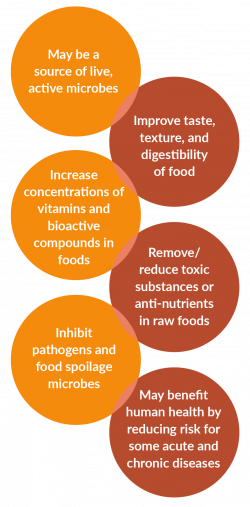
Background
Fermented foods have been a part of the human diet for millenia. Today, there are roughly 5000 varieties of fermented foods and beverages prepared and consumed worldwide, contributing to 5-40% of the human diet (1). Fermented foods and beverages were defined in 2021 by ISAPP as “foods made through desired microbial growth and enzymatic conversions of food components” (2). A broad range of fermented foods exist being produced from diverse food substrates, such as vegetables, grains, soybean, milk, fish and meat. Fermented foods often contain live microorganisms, among those are yogurt, cheese and kombucha. However, in several fermented foods the microorganisms are not alive anymore, for example in bread, pasteurised fermented vegetables, soy sauce and wine.
Process of fermentation
During fermentation, microorganisms transform the food matrix and will synthesise new components. A wide diversity of microorganisms can be used for the production of fermented foods. The most common fermented foods and beverages require lactic acid bacteria, acetic acid bacteria, bacilli or other bacteria, yeasts, or filamentous fungi (2). During fermentation several food components, e.g., carbohydrates, proteins and fibres, are transformed into other products, such as organic acids, gas or alcohol. Furthermore, microbes can also biosynthesise new molecules. These include B vitamins or antioxidants.
Benefits of fermentation
- Foods have a reduced risk of contamination (shelf life)
- New and desirable tastes and textures
- Transformation of food constituents
- Removal of undesirable food constituents like phytic acid
- Conversion to bioactives, e.g., bioactive peptides, phenolic compounds
- Synthesis of bioactive and nutritive compounds
- Delivery of commensal microbes to gastrointestinal tract

“Fermentation generates new/transformed bioactive compounds that may occur in association with probiotic bacteria. The result can be specific, advantageous functional properties. Yet, when considering the body of human studies on the topic, whether observational or experimental, it is rare to come across findings supporting the above assertion. Certainly, results are lacking to confirm the widespread idea that fermented foods have general health benefits.” (1)
References:
- (1) Rul, F. et al. (2022) Underlying evidence for the health benefits of fermented foods in humans. Food Funct., 2022,13, 4804-4824. https://doi.org/10.1039/D1FO03989J
- (2) Marco, M.L. et al. (2021) The International Scientific Association for Probiotics and Prebiotics (ISAPP) consensus statement on fermented foods. Nat Rev Gastroenterol Hepatol 18, 196–208 (2021). https://doi.org/10.1038/s41575-020-00390-5
